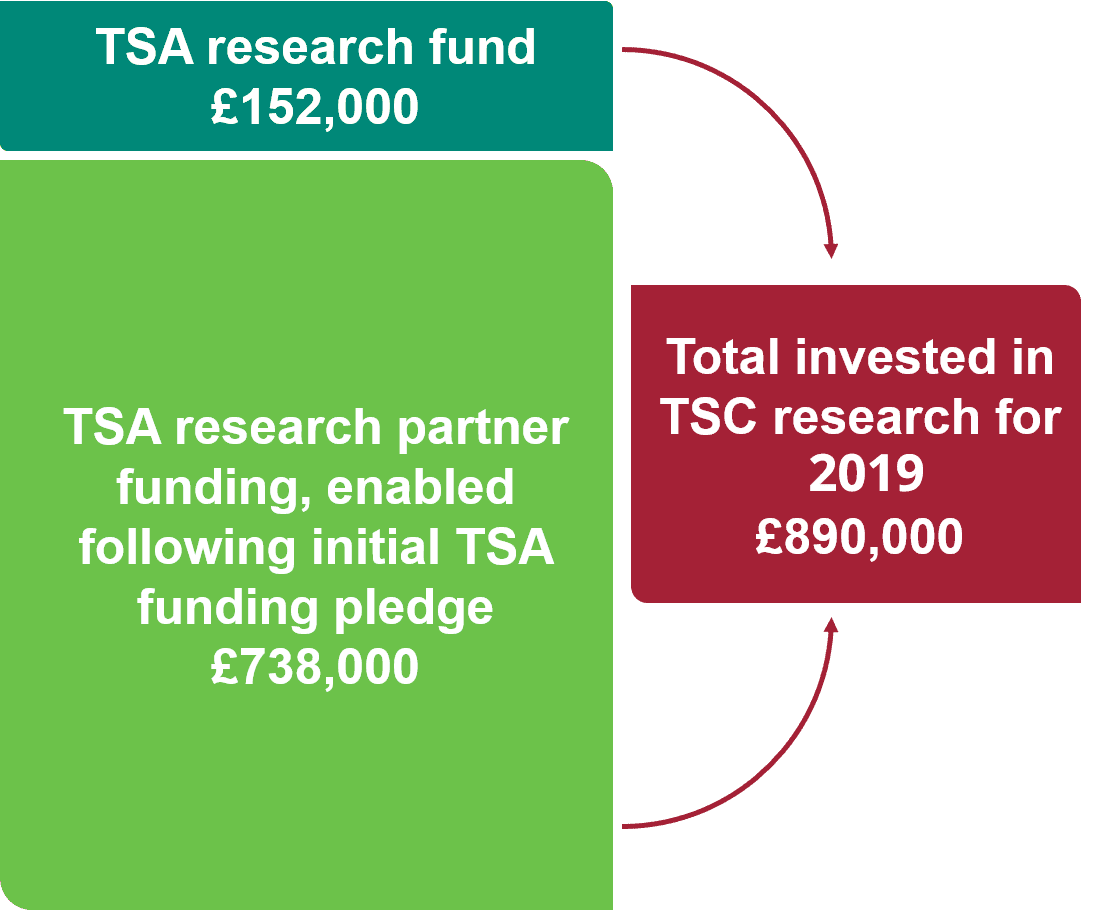Research strategy
The Tuberous Sclerosis Association’s research strategy for funding Tuberous Sclerosis Complex research
The Tuberous Sclerosis Association (TSA) is proud of our position as a world-leader in Tuberous Sclerosis Complex (TSC) research.
From improving diagnosis of TSC to trialling new strategies and medicines for managing the condition, funding new research has always been a key priority for us.
Our pledge to continue to fund new research into TSC has continues today. This is why our five-year strategy for 2019 – 2023 is to ‘REACH more people and drive more REseArCH’.
The TSA’s research approach encourages us to work closer with other groups who share the same goals that we do in researching TSC. Instead of enabling research as a sole funder, we try to share the cost of a study with other groups.
The TSA’S priorities for research into TSC are:
Animation courtesy of Paul Davis
The TSA is currently co-funding three different research projects into TSC:
Why co-funding is beneficial
By spreading the cost of funding research with other groups, we can encourage groups who might not otherwise fund TSC research alone to pledge money by working with us.
Often, this will mean that more funds are made available overall to continue to drive research into TSC.
The TSA’s new research approach also means that we can make important links and partnerships with research groups worldwide, whilst minimising the cost impact compared to if the TSA funded research alone.
This ensures that the TSA continues to be a world-leader in TSC research, ultimately benefiting the TSC community in the UK and globally.
Co-funding research: in numbers
The benefits of the TSA’s research strategy can be seen in pledged research funds for 2019. In 2019, we pledged funds of £152,000 into three separate joint research projects.
As a result of the TSA’s commitment to co-funding, this initial £152,000 sparked a further investment into the same three research projects of £738,000 from other groups.
This means the TSA’s £152,000 research fund for 2019 led to almost £900,000 being invested in research overall.

The TSA is committed to funding research in line with its six research priorities, which are consistent with the charity’s five-year strategy to reach more people and drive more research. Our vision is a world where TSC and its effects are conquered.
Our research priorities from 2019-2023 are:
Earlier diagnosis, including:
- Improving foetal ultrasound strategies
- Using neonatal EEG in those at risk to spot early signs of epilepsy
- Genetic testing through universal maternal blood tests and/or universal blood drop testing for neonates
Early risk assessment, including:
- Targeted genetic testing for families with known risks
- Genetic analysis combined with manifestations (genotype: phenotype correlations)
- Using natural history registers and databases to calculate predicted future severity of condition
Basic science and pre-clinical work, including:
- Lab-based research to understand molecular mechanisms
- Lab-based research to identify new therapeutic targets and establish effectiveness in a pre-clinical setting
- Stimulating initial stage research of TSC-gene modifying therapy in pre-clinical studies
Prevention, including:
- Trials of mTOR inhibitors and other therapies for newly diagnosed infants and older people aimed at preventing kidney damage, preventing lung damage (LAM) and earlier control of infantile spasms and other manifestations of TSC
- Diagnosis and early control of infantile spasms
- Tools to alert parents of infantile spams and how to report them to TSC clinics
- Approaches to lowering the risk of developing neuropsychiatric disorders
Research into new and available therapies, including:
- Optimising therapy for kidney disease, skin disease, LAM and epilepsy (better and more tailored treatments)
- Promoting methods for the early identification of TSC-Associated Neuropsychiatric Disorders (TAND), measuring unmet need and improving treatments for each aspect of TAND.
Social and service research, including:
- Looking at what is really affecting people’s lives and how to support them (for example, isolation, inability to work, education)
- Understanding best practice in delivering support and care from the TSA
Download resources
Related TSA pages
To provide help for today and a cure for tomorrow




